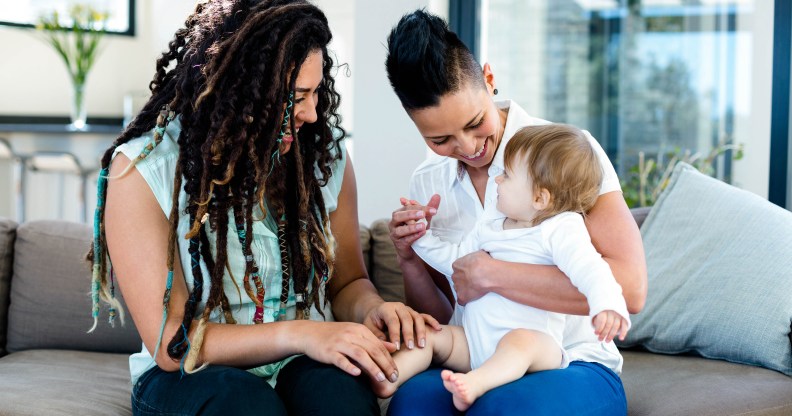Including queer and trans parents doesn’t erase straight, cisgender ones, say LGBT+ birth workers

Stock photo of queer parents. (Envato)
A group of queer birth workers have come together to address recent discussions of “trans issues” within the world of pregnancy and birth.
In an open letter, LGBT+ perinatal workers set out the discrimination and inequality that LGBT+ couples face when having children, and the challenges that medical professionals must overcome to ensure that LGBT+ people can use health services alongside their straight, cisgender counterparts.
“Most of the coverage surrounding inclusion for LGBTQ+ people in the birth world is written by and for cisgender heterosexual (cis-het) people,” the letter begins.
“We have created this document, not in response to one single event but as a means to have a voice.”
The letter comes in the wake of a transphobic row in the birthing world over who can give birth – with some cis women claiming that the experiences of trans men and non-binary people who give birth erase their own.
But as the queer birth workers set out, “the concept of the gender binary is very modern”,
Furthermore, they note, LGBT+ people routinely “experience a disparity in accessing medical care”.
The letter continues: “LGBTQ+ couples were only allowed in British law to adopt in 2002, discriminatory fostering practices were legal until this time. However, we have been growing our families alongside the cis-het community since time immemorial.
“It may appear as though there is an increasing number of LGBTQ+ folk now, but this is not the case. We are now seeing more people come out into their true selves based on a variety of factors including protection in law, access to services, social media, peer to peer support as well as popular culture moving away from only portraying LGBTQ+ folk as light entertainment or for pornography only.”
Queer birth workers offer advice on supporting LGBT+ parents
The transphobic row was partly sparked by the UK’s first trans-inclusive clinical and language guidelines, which were launched at Brighton hospital in February, with the aim of supporting trans and non-binary birthing people.
The culmination of many years’ work, the guidelines detail a series of gender-inclusive phrases for midwives, doctors and nurses to use to help LGBT+ service users feel more accepted.
In documents, protocols and trust-wide communication between healthcare teams, hospital staff are being encouraged to consider terms like “birthing parent” as well as mother or co-parent, and “parent” or “second biological parent” as well as father, depending on the circumstances.
The statement from LGBT+ perinatal workers addresses this, saying: “The difficulty with this change is that healthcare policies, procedures, and training haven’t been updated to ensure that all who move through these services will be able to access them in the same way as cis-het people.
“Healthcare professionals do not have sufficient training and support to know how to care for LGBTQ+ families. Caring for LGBTQ+ people during the perinatal period does not form a core part of the curriculum in any medical qualification we are aware of, and practice examples will rarely include families like ours.
“In addition to our healthcare professionals being unprepared for our arrival at their clinic doors, we also have a historic system, from government ministers and the Department of Health downwards, who have assumed that all perinatal care will be delivered to cis-het people.
“The difficulties for LGBTQ+ people start well before giving birth. Access to funding for fertility treatment is restricted for same-sex couples.
“Trans men may not be able to be recorded in perinatal booking systems, access appropriate antenatal testing, or physically access the obstetric ward whilst in labour. Lactating non-gestational mothers or parents fall outside of the scope of practice for midwives and therefore are not eligible for support in their breast-feeding journey.
“Existing in a system that wasn’t designed for your family can increase risks to parents’ and babies’ physical and mental health.”
They add: “We aren’t calling for the eradication of cisgender heterosexual parents. We are simply asking for a seat at the table.”
As well as the statement, the LGBT+ perinatal workers have included an action plan and a comprehensive list of resources to assist those who want to be more inclusive of queer and trans parents.

